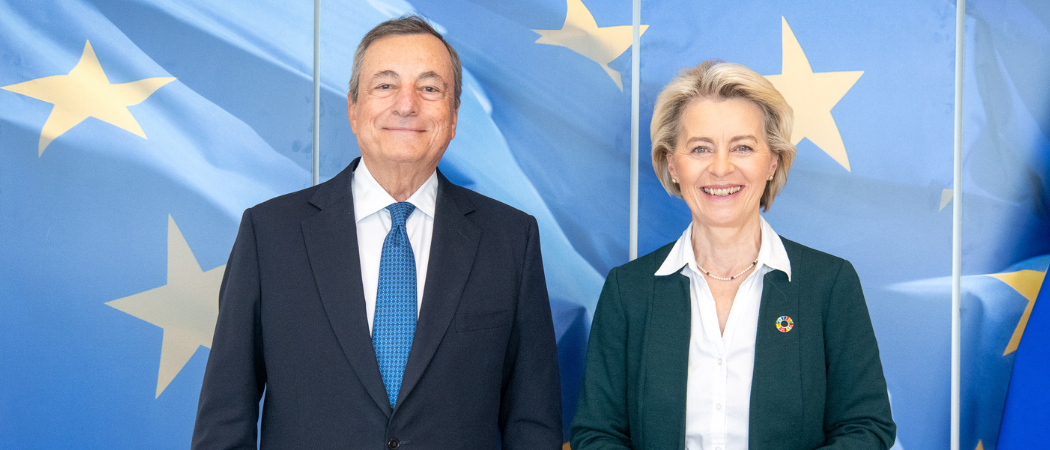Former Italian prime minister calls for more support for fundamental research ahead of the release of landmark report on EU competitiveness

Mario Draghi (left), former President of the Council of Ministers of Italy, and Ursula von der Leyen, President of the European Commission. Photo credits: Aurore Martignoni / European Union
The EU must make research and innovation a “collective priority”, former Italian prime minister Mario Draghi said on Friday as he outlined some of the key points from his highly anticipated report on EU competitiveness, set to be submitted to the Commission next month.
“A common agenda could include reinforced support for fundamental research, centred on academic excellence, an increased focus on disruptive innovation, and a greater capacity to support start-ups and help them grow,” Draghi said in his acceptance speech upon receiving the Charles V European Award in Spain.
His speech focused on how the EU could catch up with the US. In Europe, economic growth has been sluggish in most member states, with inflation cutting into stagnating income.
According to Draghi, the productivity gap between the EU and the US is down to the tech sector and is set to widen with the development of artificial intelligence, currently dominated by American companies.
European companies spend half as much as US firms on research and innovation as a share of GDP, and the EU is also worse at translating fundamental research into commercialisation, Draghi said.
A key challenge is helping companies scale up, and this will require enabling them to operate more easily across the Single Market. “As an example, cloud computing in public administration needs to be framed by a single set of rules,” he said.
His comments echo the conclusions of another former Italian prime minister, Enrico Letta, whose recent report on the future of the Single Market urged the EU to create a “fifth freedom” dedicated to research, innovation, knowledge and education.
Another report published in April by a group of economists from France, Germany and Italy similarly concluded that Europe should focus more on funding high-risk, breakthrough research, in high-tech industries. Many of the European companies which spend the most on R&D are in the automotive sector, which does not require the same R&D intensity or offer the same growth potential as high-tech industries.
The European research community is now debating the best approach for the next framework programme for research and innovation, FP10, to run from 2028 to 2034. One of the key questions is how to achieve the right balance between strategic priority setting and bottom-up research.
To bridge the gap with the US, Draghi is calling for a more coordinated approach to public funding. Public spending on R&I represents around 0.7% of GDP on both sides of the Atlantic, “but in the United States the vast majority of spending takes place at the federal level, ensuring that public funds flow efficiently towards national priorities,” he said. Whereas in Europe, just one tenth of R&I spending happens at the EU level.
“There is significant scope for improvement simply through setting clearer priorities, streamlining regulation and better coordinating different financing instruments,” he added.
Public spending alone will not be enough to achieve Europe’s green and digital objectives, particularly at a time of economic pressure and belt tightening. This means it will be necessary to “mobilise private savings on an unprecedented scale, and far beyond what the banking sector can provide,” Draghi said, by “deepening our markets for risk capital, equities and bonds”.
He suggests simplifying and expanding the European projects of common interest, issuing more public debt, and “common financing”. The former European Central Bank (ECB) president has previously advocated for joint EU borrowing in areas including defence.
Tariffs and subsidies
In addition to its recommendations for a competitive EU industrial policy, Draghi’s upcoming report will include proposals for an updated trade policy to respond to the strained geopolitical environment and reduce dependencies on third countries.
In his speech last week, he stressed the need for a “common assessment of the geopolitical risks we face,” followed by a “genuine ‘foreign economic policy’”. This means that if countries such as China do not commit to rules-based trade relations, the EU should consider responding with subsidies and tariffs of its own.
“We don’t want to become protectionist in Europe, but we cannot be passive if the actions of others are threatening our prosperity,” he said. With the caveat that the EU should not impose tariffs on genuine innovations or on industries where domestic producers are already too far behind.
Last week the Commission announced it would impose additional duties of up to 38.1% on electric vehicles imported from China from 4 July if the two sides fail to come to an agreement over what the EU sees as unfair subsidies from the Chinese government.
Both the Letta and Draghi reports are expected to have a significant impact on EU research and innovation policy in the years ahead. At a special meeting of the European Council in April, EU leaders called for a “new European competitiveness deal”, with progress on R&I, industrial policy, and strengthening the Single Market and Capital Markets Union.
Draghi remains an influential figure in EU circles for his role in steering the Eurozone through crisis after taking the reins at the ECB in 2011. He has been mooted for one of the top jobs in Brussels, with the fate of both the European Commission and European Council presidencies still up in the air.





 A unique international forum for public research organisations and companies to connect their external engagement with strategic interests around their R&D system.
A unique international forum for public research organisations and companies to connect their external engagement with strategic interests around their R&D system.